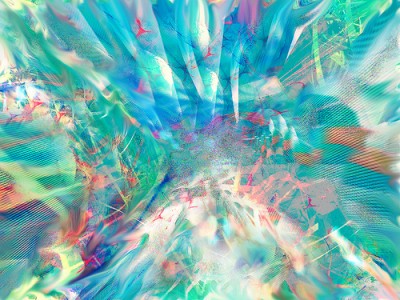David Peat writes in “Synchronicity: The Bridge Between Matter and Mind,”
“At its height, toward the end of the nineteenth century, Newtonian mechanics had become the model for all other sciences. …The universe had been transformed from a living organism into something that was much closer to a machine, a machine albeit of immense ingenuity in its construction and operation, but nonetheless mechanical… Within such a machine, however, there is little room for values and meaning or for the inner facts of experience and revelation. And even human nature could be apparently reduced to the functioning of the instincts and repressions, which, in turn, had their origins as flows of energy arising in electrochemical reactions of the nervous system.
“Quantum theory and relativity had a revolutionary effect on this Newtonian approach, not only in transforming the formalism of physics but also in changing the worldview that was associated with it. Neils Bohr, for example, stressed that quantum theory had revealed the essential indivisibility of nature while Heisenberg’s uncertainty principle indicated the extent to which an observer intervenes in the system he observes.
“Yet despite the important revolutions that have taken place within physics, old ways of thinking continue to dominate our relationship to nature… The worldview that we have all inherited from an outmoded physics still has a profound effect on our whole lives; it permeates our attitudes to society, government, and human relationships and suggests that every adverse situation can be analyzed into an isolated ‘problem’ with a corresponding solution or means of control.” (Peat, 1987)
And it is this worldview that has “hypnotized” us into perceiving the world the way we do. It is the foundation of our belief systems.
It has been said that physics – the study of the deep nature of our world – determines our belief systems. Unfortunately, for the most part, the belief systems of humanity are over 50 years behind the general understanding of our reality as studied by physicists.
The study of Synchronicity suggests that there is an underlying harmony or mosaic to nature, a pattern that is ‘the umbilical cord that connects thought, feelings, science and art with the womb of the universe which gave birth to them. There is confirmation of this ‘patterning’ in the symbolic alchemical texts of the Middle Ages, Tantric texts and other ancient writings. These texts talk about a universe that unfolds according to a hidden, dynamic order. (Peat, 1987)
Carl Jung defined synchronicity as ‘the coincidence in time of two or more causally unrelated events which have the same meaning.’ His implication is clear – certain events in the universe cluster together into meaningful patterns without recourse to the normal pushes and pulls of causality. these synchronicites therefore must transcend the normal laws of science, for they are the EXPRESSIONS OF MUCH DEEPER MOVEMENTS THAT ORIGINATE IN THE GROUND OF THE UNIVERSE and involve, in an inseparable way, both matter and meaning.
This ‘acausal connecting principle‘ flies in the face of the worldview that is based on a causally dominated universe. And, this worldview, interestingly, is a result of the imposition of Christianity which made linear time, or the “beginning and end” of the universe an essential tenet of faith. In order to control humanity, the “End” had to be postulated, with its attendant judgment of the saved or damned, so that the church could be the purveyors of salvation.
Causality is defined very loosely, as a ‘chain of cause and effect.’ This means a series of links, in which each one is firmly locked into its two neighbors so that the whole chain is able to stretch out indefinitely in both directions. In this way, every event in the universe is causally linked to an event that comes before it and to one that comes after. There can be no room in this ‘creation’ for free will, creativity, or synchronicity.
This, of course, does not describe causality sufficiently because a single event can be at the junction of many interlinked “chains” of causes which all act upon the result or a single event can branch out into many “chains” and be at the root of many later and varied events. But, for the present purpose, the idea of causality is that one thing leads to another and another and so on.
How then do we understand Jung’s “acausal connecting principle?” One way of looking at it is to imagine a miniature flat-surface world occupied by tiny two-dimensional beings, and that this “world” is like a membrane or plastic. If a person comes along and pushes the ends of their five fingers through the membrane, the “plane beings” will see this as five separate intrusions of some strange disk-like objects and will have no conception of the idea of the whole hand to which the fingers are attached. Each “disk” will seem to be discrete and unrelated to the others except in “time” of occurrence. There may be forces in higher densities that are similar to this illustration in relation to our reality. This would be “acausal” from our perspective.
Before one can understand the “alien” interactions with the human race, it is first necessary to break the hypnotic hold of causality on our vision. The belief in causality is based on a habit of mind through repeated historical precedent and is far from being a logical proof of inevitability. Just because it has been observed on many occasions in the past that B follows A, it does not logically follow that this succession will occur in the future!
Cassiopaea.org
Copyright © 1997-1999 Cassiopaea org. All rights reserved.

